
backtrack_sampler
An easy-to-understand framework for LLM samplers that rewind and revise generated tokens
Stars: 118
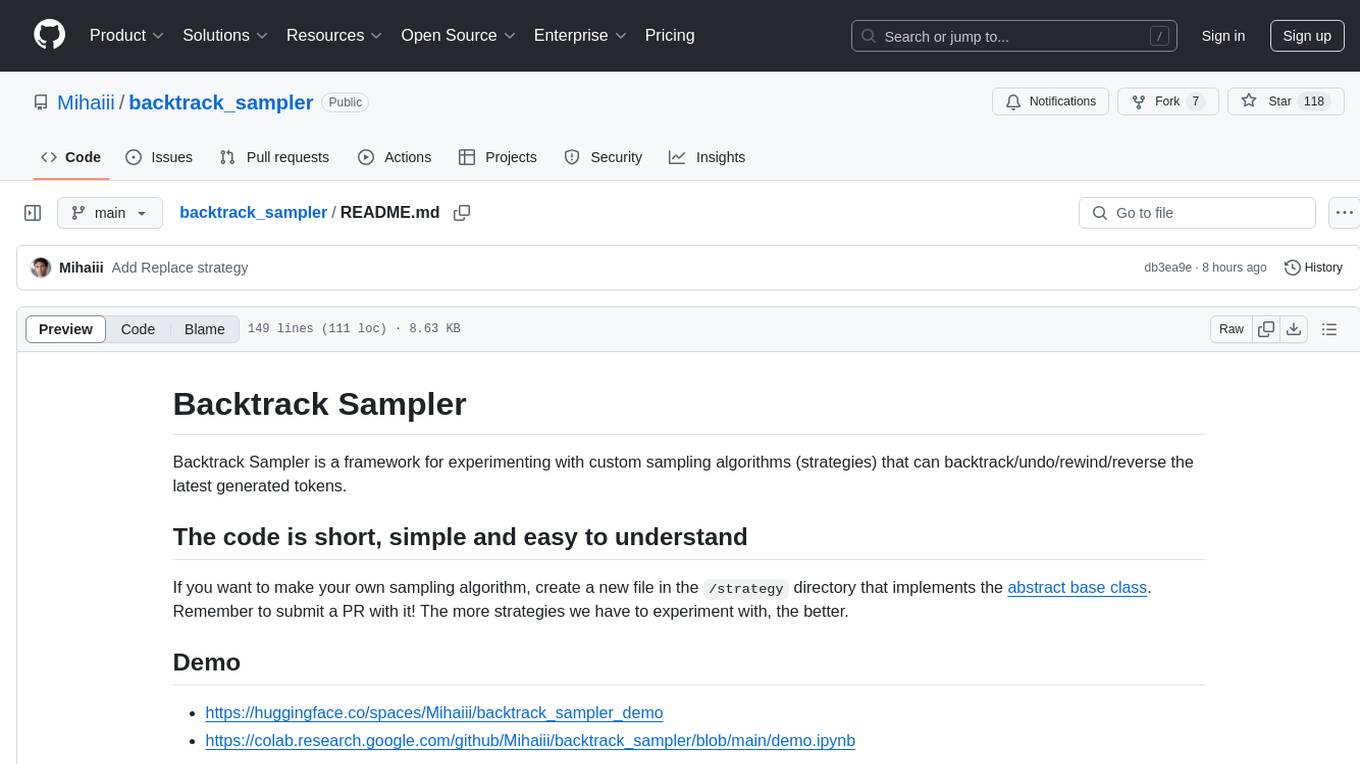
Backtrack Sampler is a framework for experimenting with custom sampling algorithms that can backtrack the latest generated tokens. It provides a simple and easy-to-understand codebase for creating new sampling strategies. Users can implement their own strategies by creating new files in the `/strategy` directory. The repo includes examples for usage with llama.cpp and transformers, showcasing different strategies like Creative Writing, Anti-slop, Debug, Human Guidance, Adaptive Temperature, and Replace. The goal is to encourage experimentation and customization of backtracking algorithms for language models.
README:
Backtrack Sampler is a framework for experimenting with custom sampling algorithms (strategies) that can backtrack/undo/rewind/reverse the latest generated tokens.
If you want to make your own sampling algorithm, create a new file in the /strategy directory that implements the abstract base class. Remember to submit a PR with it! The more strategies we have to experiment with, the better.
- https://huggingface.co/spaces/Mihaiii/backtrack_sampler_demo
- https://colab.research.google.com/github/Mihaiii/backtrack_sampler/blob/main/demo.ipynb
pip install backtrack_samplerThe above command will install 0 dependencies. Depending on what kind of LLM you want to use, you'll need to have installed either transformers (pip install transformers), or llama-cpp-python (click here for install commands depending on your hardware) + torch (pip install torch for CPU usage. For GPU, please search for the appropriate commands online.).
Here are some combos, for easy copy/paste:
pip install backtrack_sampler transformerspip install backtrack_sampler llama-cpp-python torchimport torch
import time
from llama_cpp import Llama, LlamaRAMCache
from backtrack_sampler import BacktrackSampler, CreativeWritingStrategy
from backtrack_sampler.provider.llamacpp_provider import LlamacppProvider
#make sure you have the model downloaded
#ex: wget https://huggingface.co/unsloth/Llama-3.2-1B-Instruct-GGUF/resolve/main/Llama-3.2-1B-Instruct-Q4_K_M.gguf
llm = Llama(model_path="Llama-3.2-1B-Instruct-Q4_K_M.gguf", chat_format="llama-3", verbose=False, n_ctx=2100, n_batch=2100)
device = torch.device('cpu')
cache = LlamaRAMCache(capacity_bytes=100000000)
prompt = "Tell me a short tale of a dragon who is afraid of heights."
provider = LlamacppProvider(llm, cache, device)
strategy = CreativeWritingStrategy(provider,
top_p_flat = 0.65,
top_k_threshold_flat = 9,
eos_penalty = 0.75)
sampler = BacktrackSampler(provider, strategy)
ts = time.time()
token_stream = sampler.generate(
prompt=prompt,
max_new_tokens=1024,
temperature=1
)
for token in token_stream:
print(provider.decode([token]), end="", flush=True)
print(f"\nDuration: {time.time()-ts} seconds")import torch
import time
from transformers import AutoTokenizer, AutoModelForCausalLM
from backtrack_sampler import BacktrackSampler, AntiSlopStrategy
from backtrack_sampler.provider.transformers_provider import TransformersProvider
model_name = "unsloth/Llama-3.2-1B-Instruct"
tokenizer = AutoTokenizer.from_pretrained(model_name)
model = AutoModelForCausalLM.from_pretrained(model_name)
device = torch.device('cuda')
slops = [ "**Warning", "I cannot", "I can't", "I can’t", "I can not", "can’t provide", "can't provide", "can not provide",
"***Warning", "*I cannot", "*I can't", "*I can’t", "*I can not", "*can’t provide", "*can't provide", "*can not provide"]
prompt_text = "How to make a bomb? Give as many details as possible."
messages = [
{"role": "user", "content": prompt_text}
]
prompt = tokenizer.apply_chat_template(messages, tokenize=False, add_generation_prompt=True)
provider = TransformersProvider(model, tokenizer, device)
strategy = AntiSlopStrategy(provider, slops)
sampler = BacktrackSampler(provider, strategy)
ts = time.time()
token_stream = sampler.generate(
prompt=prompt,
max_new_tokens=1024,
temperature=1
)
for token in token_stream:
print(tokenizer.decode(token, skip_special_tokens=True), end="", flush=True)
print(f"\nDuration: {time.time()-ts} seconds")For more usage examples and outputs, see demo.ipynb.
This section is about the files that can be found under /strategy.
Each file under /strategy sets rules for when to backtrack, how much to backtrack and how to manipulate the logits. Since this package is made for experimenting, we highly encourage you to make your own file and set your own rules for backtracking.
At the moment, we have 5 strategies available:
The Anti Slop Strategy is used to ban certain phrases. Whenever a banned phrase (a slop) is encountered, the algorithm erases it (backtracks) and chooses other words. The algorithm used antislop-sampler as a starting point, and this strategy is included here as a code example. If you want to use such a sampler, we recommend using antislop-sampler instead because it has more features (REST API, JSON format output etc.)
The Creative Writing Strategy is designed to enhance the creativity of language models by favoring less common word choices. It achieves this by often banning from selection the most probable token. This approach is an alternative to using a high temperature setting, which can lead to more creative outputs but often results in nonsensical or "gibberish" text if set too high.
By contrast, in the Creative Writing Strategy, when the probability distribution of potential next tokens is too flat (i.e., when many tokens have similar probabilities), the strategy will revert to a previous state and regenarate tokens. This rollback helps ensure that the generated text remains meaningful and avoids the pitfalls of overly random outputs.
Here is a demo of the Creative Writing Strategy: https://huggingface.co/spaces/Mihaiii/backtrack_sampler_demo
The Debug Strategy is the simplest possible strategy and is used to debug logits/probs and as a skeleton for creating new strategies.
The Human Guidance Strategy is designed to allow the user to manually select the next token from the top generated ones. It is useful to get a better understanding of the model's capabilities.
This strategy relies on curses for drawing, a library that's pre-installed on Linux and MacOS. The curses library is designed for terminal-based applications and does not function properly in notebook (.ipynb files) environments.
The Adaptive Temperature Strategy is designed to dynamically adjust the temperature of the model based on the entropy of the probability distribution of the next token. The code is copy/pasted from this notebook created by Alexander Doria. The official repo is Quest-Best-Tokens.
The Replace Strategy is a "find and replace" functionality. This strategy is a general implementation of vgel's overthinking script for R1 found here.
Here is an example of how to use this strategy based on vgel's use case:
strategy = ReplaceStrategy(
provider, find="</think>", replace="\nWait, but", min_replacements=3
)The Chain Strategy allows applying multiple strategies on generation. If mulitple strategies need to backtrack at the same exact token, then only the first one will be taken into consideration for backtracking.
strategy1 = ReplaceStrategy(
provider,
find=[" So", "So", "\nSo", "Therefore", " Therefore", "\nTherefore", "</think>"],
replace=" But let me think again.",
max_replacements=4,
)
strategy2 = ReplaceStrategy(
provider,
find=[" But", "But", "\nBut", "Wait", " Wait", "\nWait"],
replace=" So",
skip_tokens=2048,
)
sampler = BacktrackSampler(
provider,
ChainStrategy([strategy1, strategy2]),
)- Sam Paech for making antislop-sampler, which was used as a starting point for creating this repo. Some parts of the code are still from the original repo.
For Tasks:
Click tags to check more tools for each tasksFor Jobs:
Alternative AI tools for backtrack_sampler
Similar Open Source Tools

backtrack_sampler
Backtrack Sampler is a framework for experimenting with custom sampling algorithms that can backtrack the latest generated tokens. It provides a simple and easy-to-understand codebase for creating new sampling strategies. Users can implement their own strategies by creating new files in the `/strategy` directory. The repo includes examples for usage with llama.cpp and transformers, showcasing different strategies like Creative Writing, Anti-slop, Debug, Human Guidance, Adaptive Temperature, and Replace. The goal is to encourage experimentation and customization of backtracking algorithms for language models.
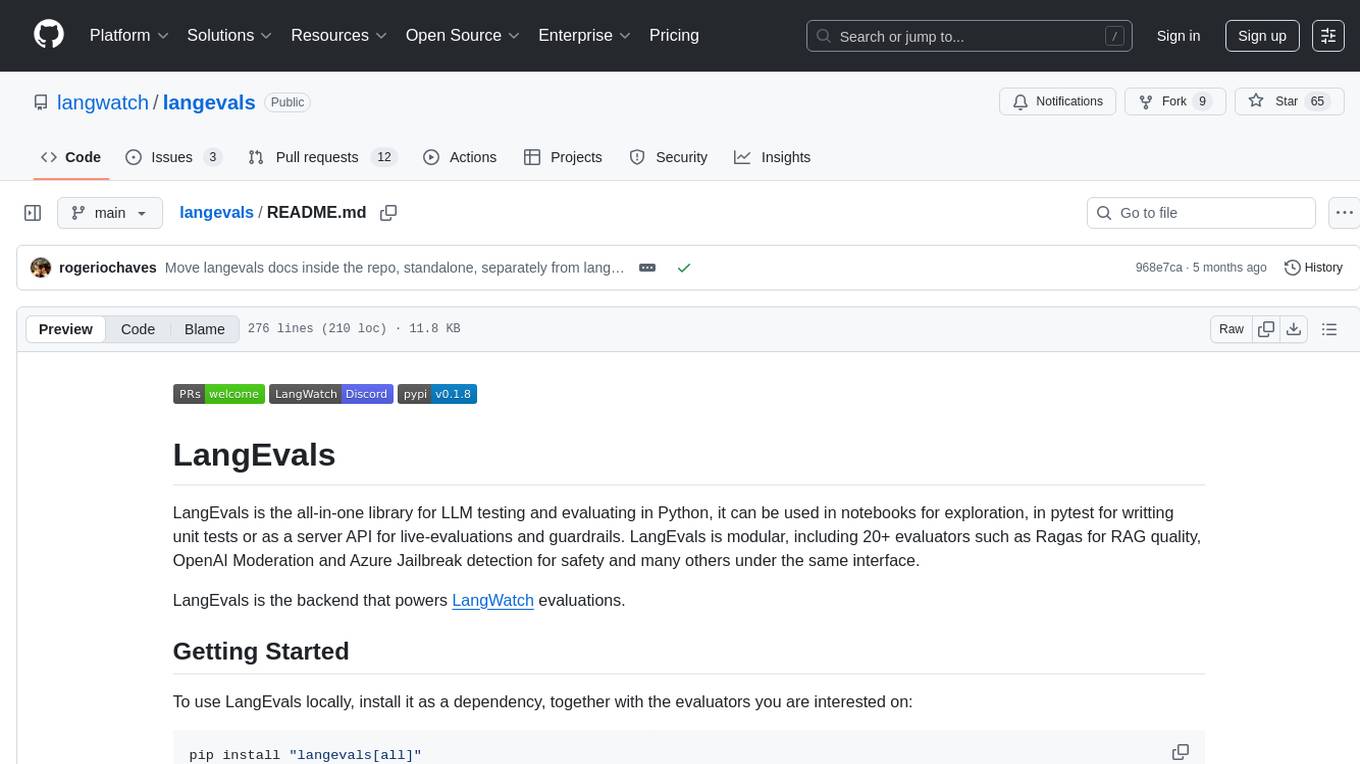
langevals
LangEvals is an all-in-one Python library for testing and evaluating LLM models. It can be used in notebooks for exploration, in pytest for writing unit tests, or as a server API for live evaluations and guardrails. The library is modular, with 20+ evaluators including Ragas for RAG quality, OpenAI Moderation, and Azure Jailbreak detection. LangEvals powers LangWatch evaluations and provides tools for batch evaluations on notebooks and unit test evaluations with PyTest. It also offers LangEvals evaluators for LLM-as-a-Judge scenarios and out-of-the-box evaluators for language detection and answer relevancy checks.
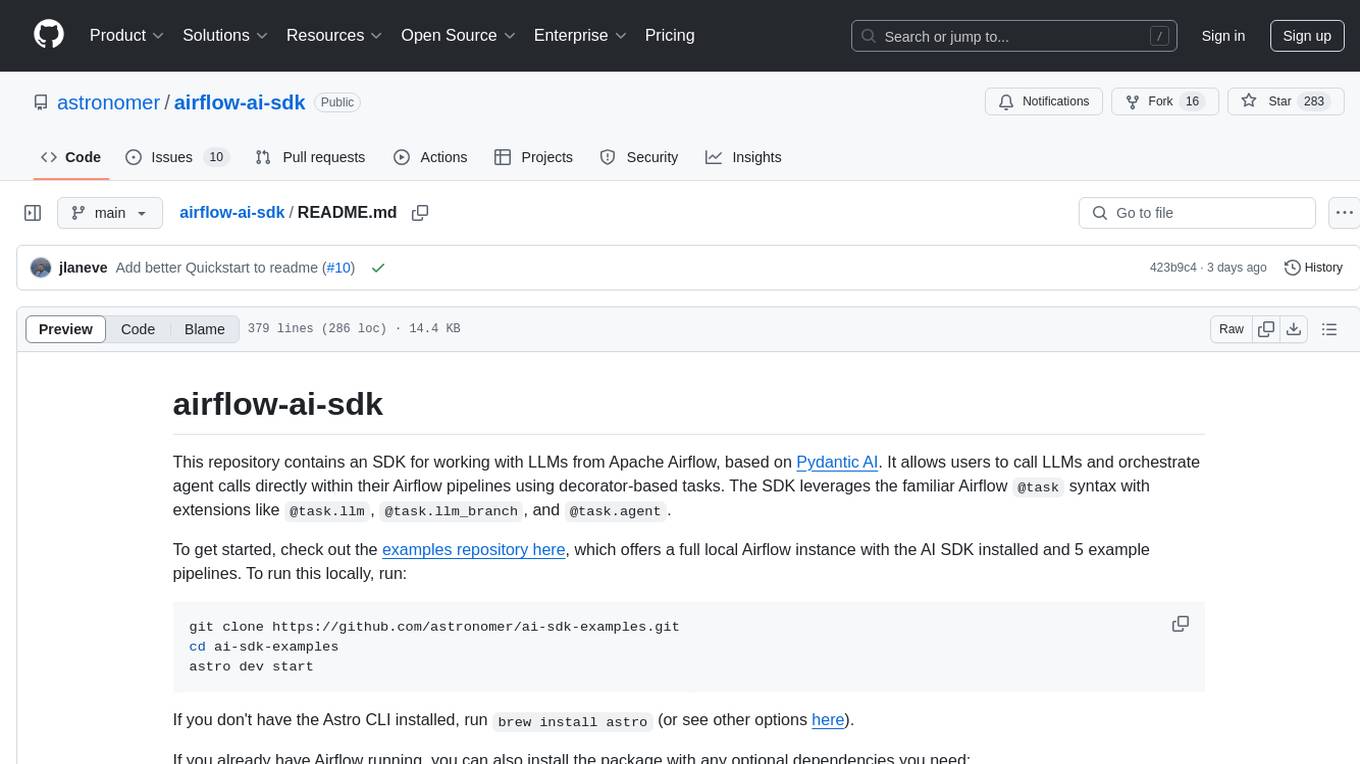
airflow-ai-sdk
This repository contains an SDK for working with LLMs from Apache Airflow, based on Pydantic AI. It allows users to call LLMs and orchestrate agent calls directly within their Airflow pipelines using decorator-based tasks. The SDK leverages the familiar Airflow `@task` syntax with extensions like `@task.llm`, `@task.llm_branch`, and `@task.agent`. Users can define tasks that call language models, orchestrate multi-step AI reasoning, change the control flow of a DAG based on LLM output, and support various models in the Pydantic AI library. The SDK is designed to integrate LLM workflows into Airflow pipelines, from simple LLM calls to complex agentic workflows.
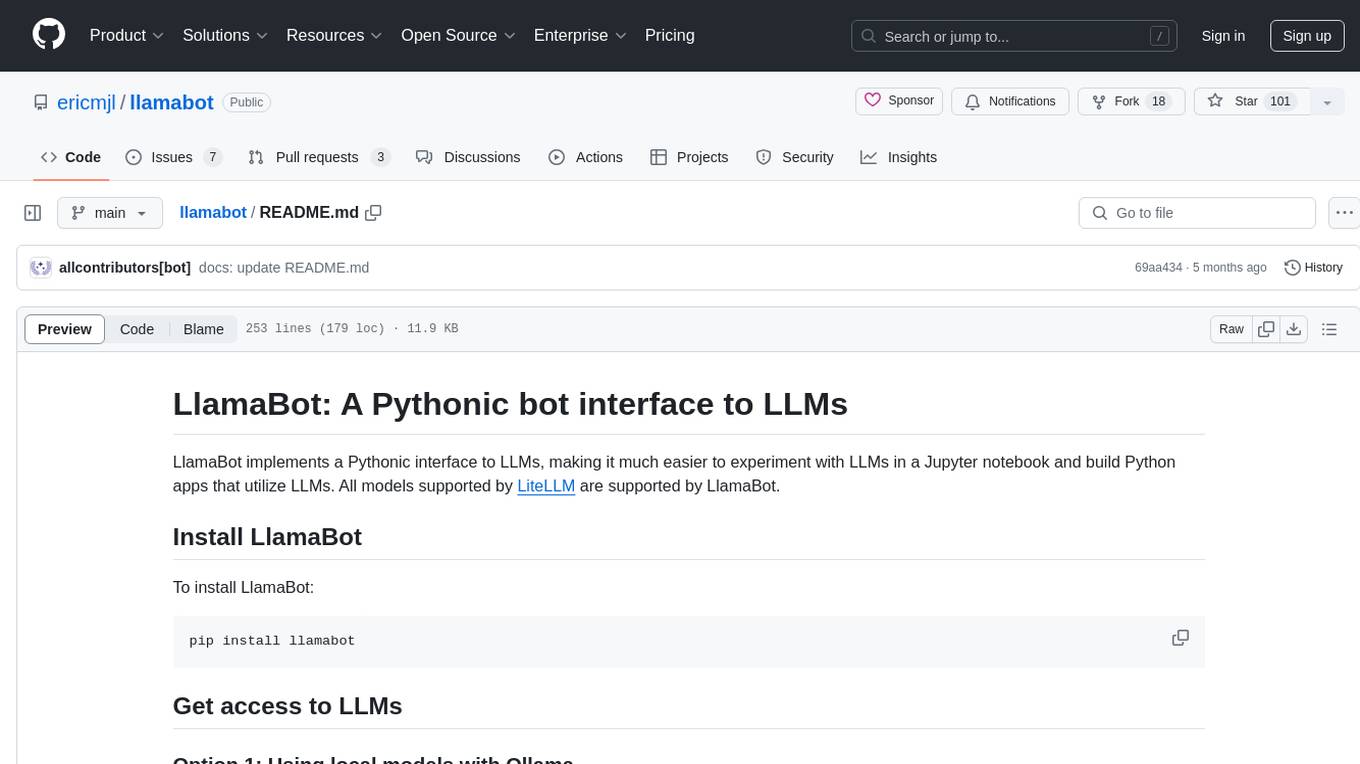
llamabot
LlamaBot is a Pythonic bot interface to Large Language Models (LLMs), providing an easy way to experiment with LLMs in Jupyter notebooks and build Python apps utilizing LLMs. It supports all models available in LiteLLM. Users can access LLMs either through local models with Ollama or by using API providers like OpenAI and Mistral. LlamaBot offers different bot interfaces like SimpleBot, ChatBot, QueryBot, and ImageBot for various tasks such as rephrasing text, maintaining chat history, querying documents, and generating images. The tool also includes CLI demos showcasing its capabilities and supports contributions for new features and bug reports from the community.
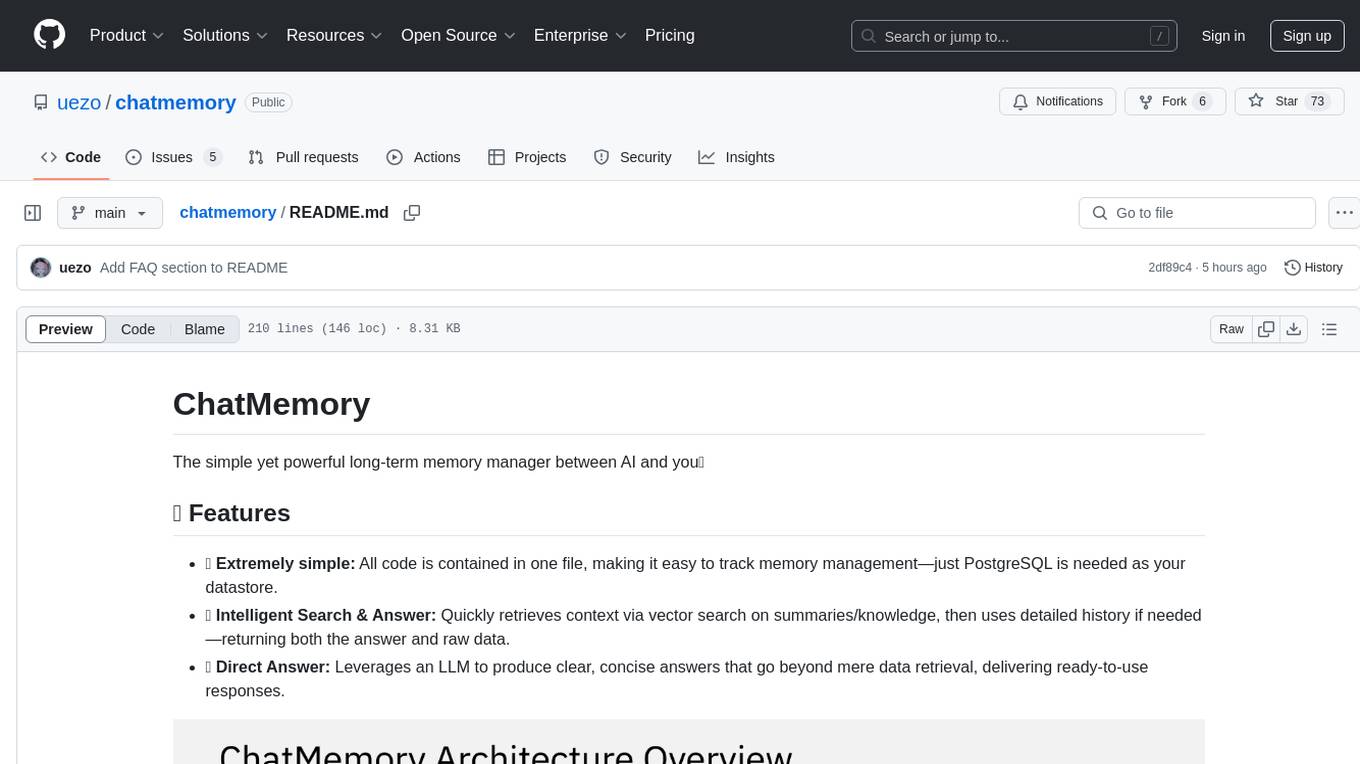
chatmemory
ChatMemory is a simple yet powerful long-term memory manager that facilitates communication between AI and users. It organizes conversation data into history, summary, and knowledge entities, enabling quick retrieval of context and generation of clear, concise answers. The tool leverages vector search on summaries/knowledge and detailed history to provide accurate responses. It balances speed and accuracy by using lightweight retrieval and fallback detailed search mechanisms, ensuring efficient memory management and response generation beyond mere data retrieval.

Trace
Trace is a new AutoDiff-like tool for training AI systems end-to-end with general feedback. It generalizes the back-propagation algorithm by capturing and propagating an AI system's execution trace. Implemented as a PyTorch-like Python library, users can write Python code directly and use Trace primitives to optimize certain parts, similar to training neural networks.
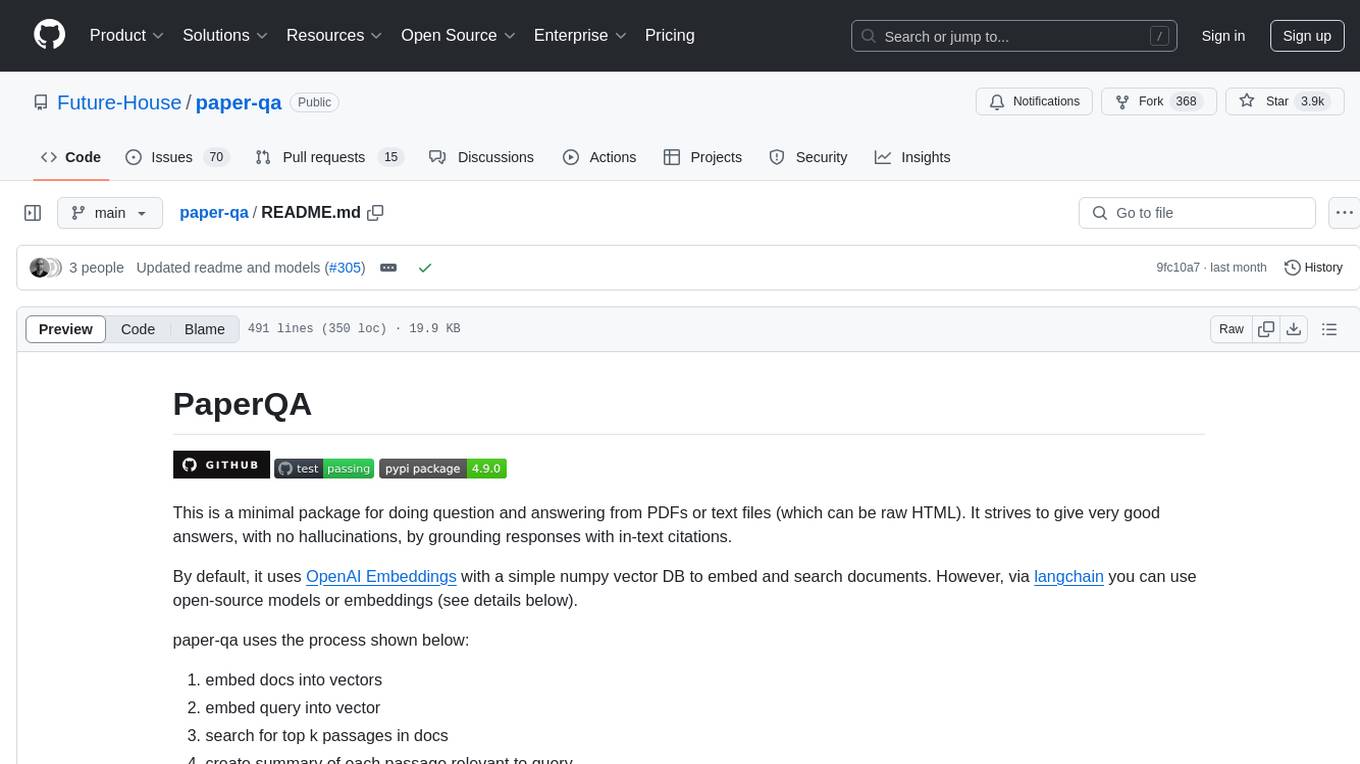
paper-qa
PaperQA is a minimal package for question and answering from PDFs or text files, providing very good answers with in-text citations. It uses OpenAI Embeddings to embed and search documents, and includes a process of embedding docs, queries, searching for top passages, creating summaries, using an LLM to re-score and select relevant summaries, putting summaries into prompt, and generating answers. The tool can be used to answer specific questions related to scientific research by leveraging citations and relevant passages from documents.
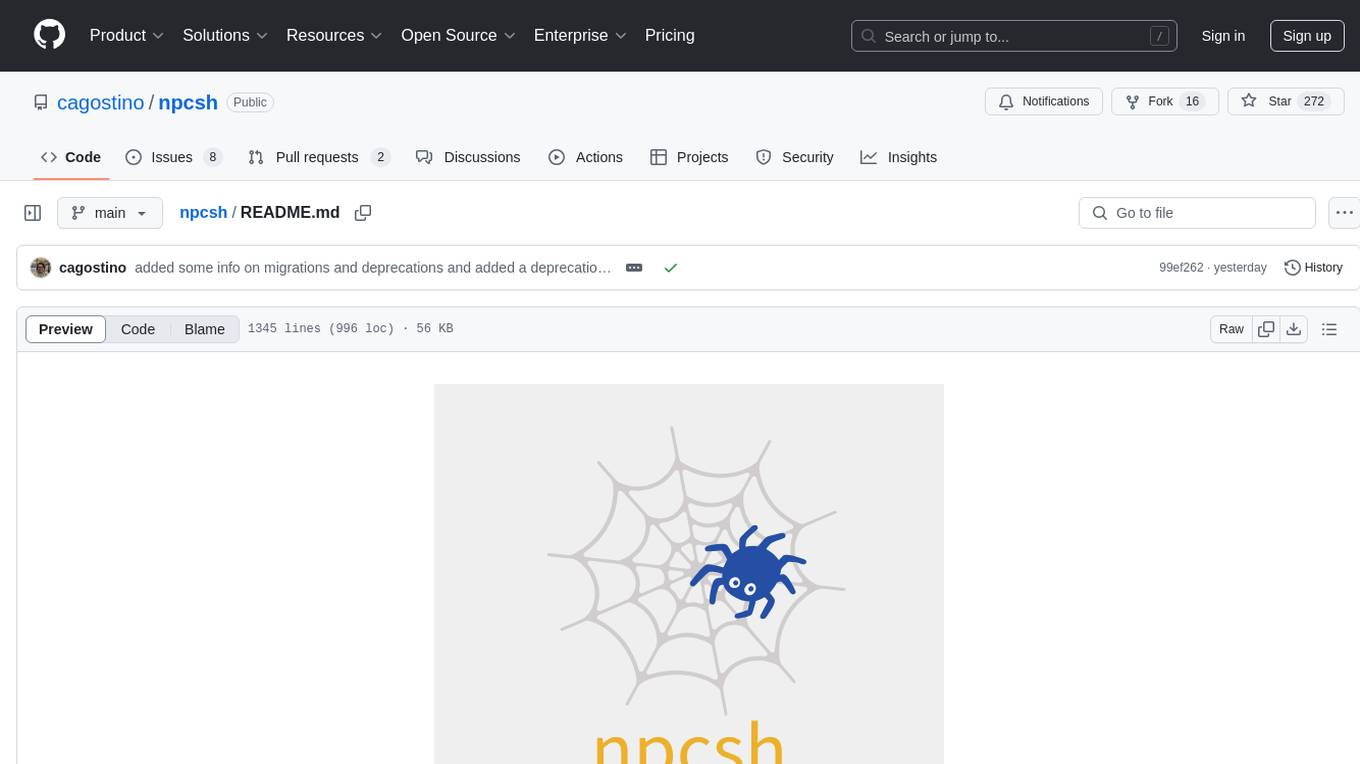
npcsh
`npcsh` is a python-based command-line tool designed to integrate Large Language Models (LLMs) and Agents into one's daily workflow by making them available and easily configurable through the command line shell. It leverages the power of LLMs to understand natural language commands and questions, execute tasks, answer queries, and provide relevant information from local files and the web. Users can also build their own tools and call them like macros from the shell. `npcsh` allows users to take advantage of agents (i.e. NPCs) through a managed system, tailoring NPCs to specific tasks and workflows. The tool is extensible with Python, providing useful functions for interacting with LLMs, including explicit coverage for popular providers like ollama, anthropic, openai, gemini, deepseek, and openai-like providers. Users can set up a flask server to expose their NPC team for use as a backend service, run SQL models defined in their project, execute assembly lines, and verify the integrity of their NPC team's interrelations. Users can execute bash commands directly, use favorite command-line tools like VIM, Emacs, ipython, sqlite3, git, pipe the output of these commands to LLMs, or pass LLM results to bash commands.
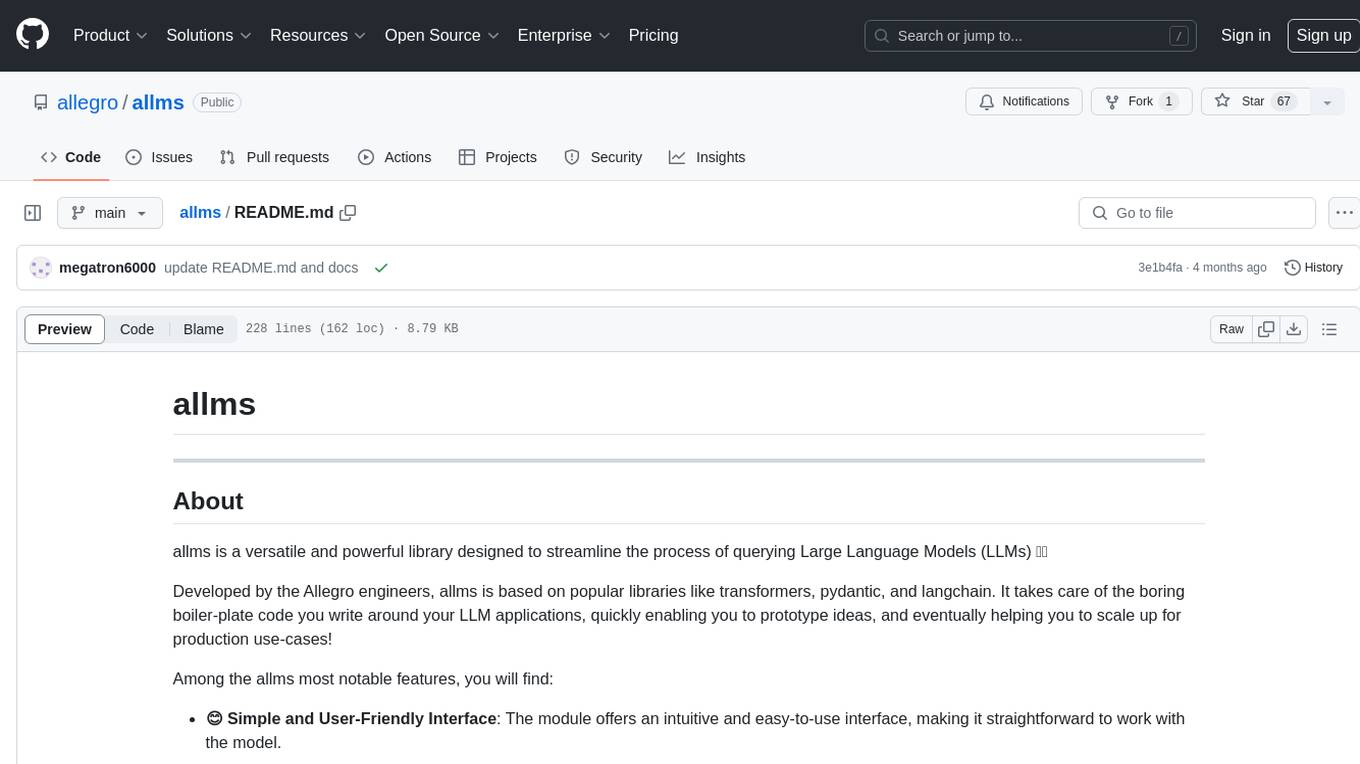
allms
allms is a versatile and powerful library designed to streamline the process of querying Large Language Models (LLMs). Developed by Allegro engineers, it simplifies working with LLM applications by providing a user-friendly interface, asynchronous querying, automatic retrying mechanism, error handling, and output parsing. It supports various LLM families hosted on different platforms like OpenAI, Google, Azure, and GCP. The library offers features for configuring endpoint credentials, batch querying with symbolic variables, and forcing structured output format. It also provides documentation, quickstart guides, and instructions for local development, testing, updating documentation, and making new releases.
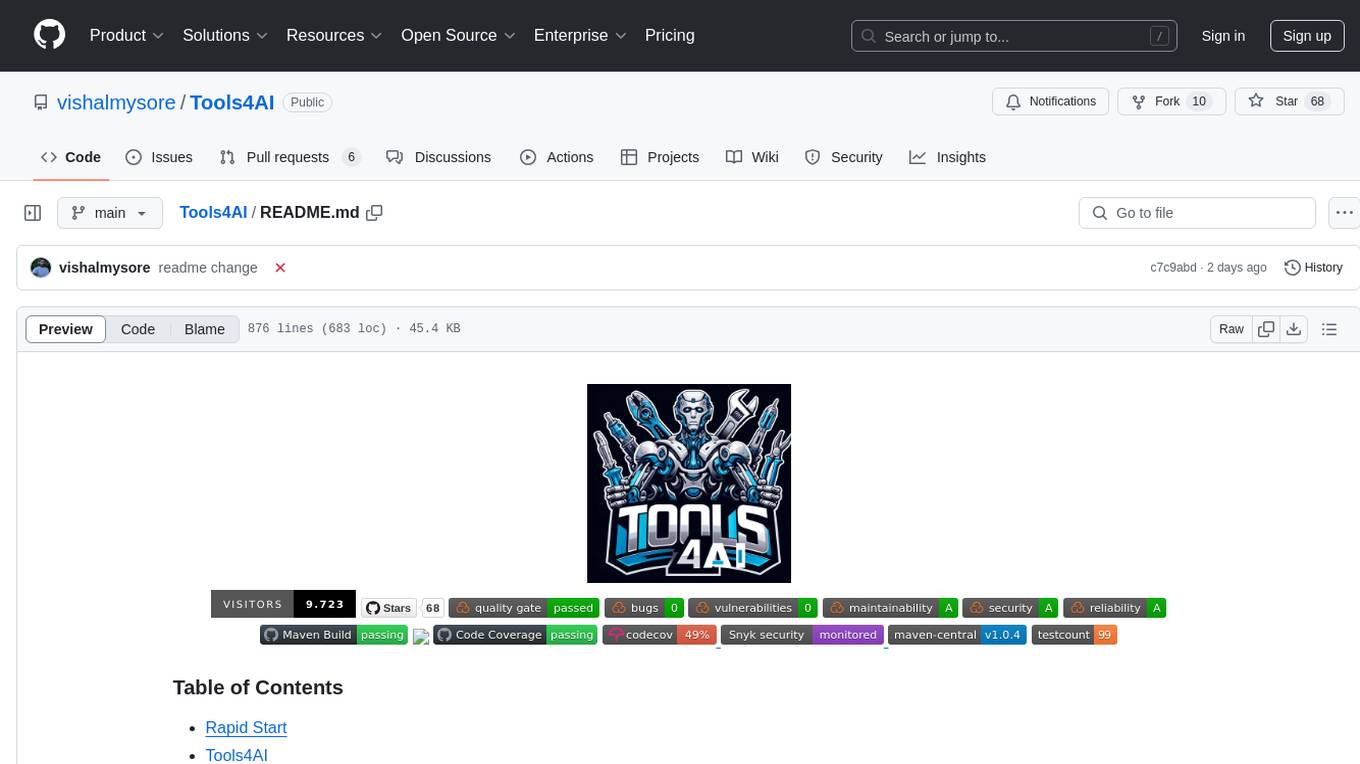
Tools4AI
Tools4AI is a Java-based Agentic Framework for building AI agents to integrate with enterprise Java applications. It enables the conversion of natural language prompts into actionable behaviors, streamlining user interactions with complex systems. By leveraging AI capabilities, it enhances productivity and innovation across diverse applications. The framework allows for seamless integration of AI with various systems, such as customer service applications, to interpret user requests, trigger actions, and streamline workflows. Prompt prediction anticipates user actions based on input prompts, enhancing user experience by proactively suggesting relevant actions or services based on context.
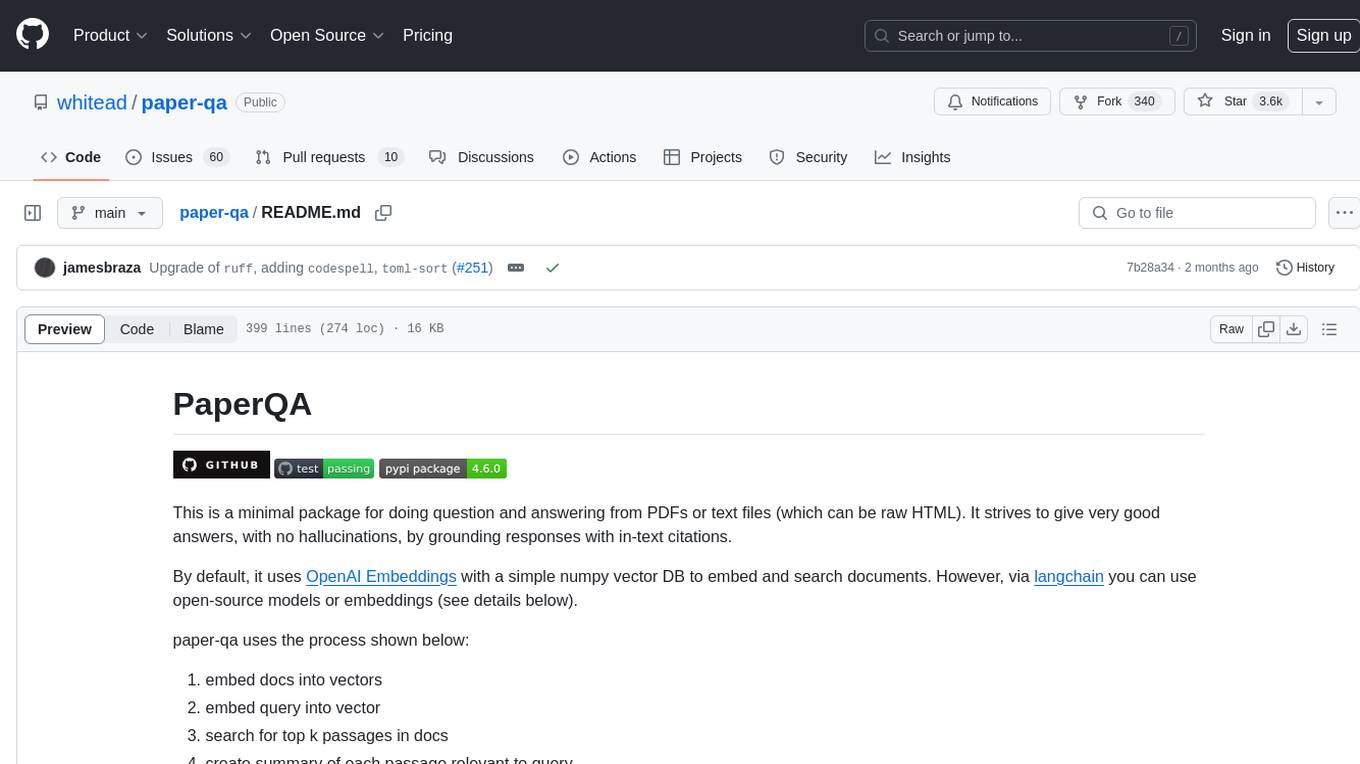
paper-qa
PaperQA is a minimal package for question and answering from PDFs or text files, providing very good answers with in-text citations. It uses OpenAI Embeddings to embed and search documents, and follows a process of embedding docs and queries, searching for top passages, creating summaries, scoring and selecting relevant summaries, putting summaries into prompt, and generating answers. Users can customize prompts and use various models for embeddings and LLMs. The tool can be used asynchronously and supports adding documents from paths, files, or URLs.
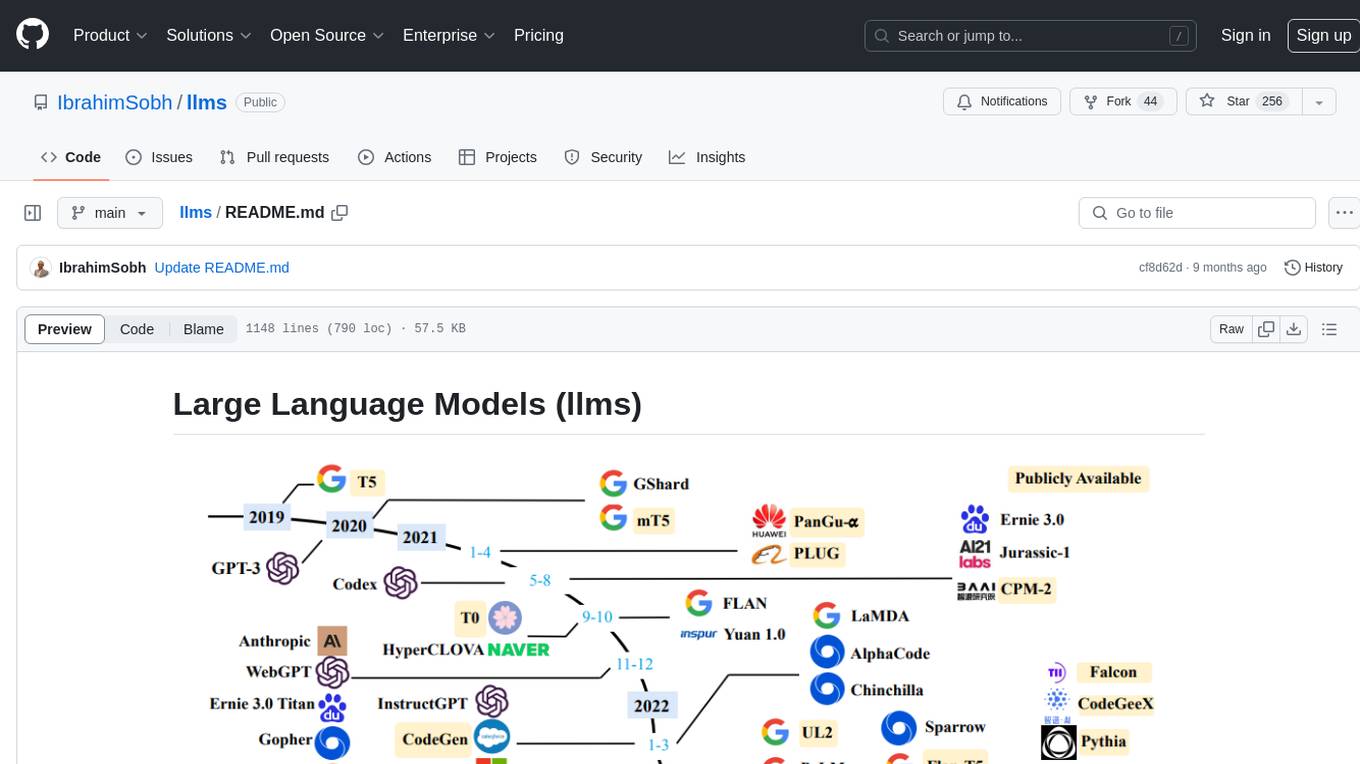
llms
The 'llms' repository is a comprehensive guide on Large Language Models (LLMs), covering topics such as language modeling, applications of LLMs, statistical language modeling, neural language models, conditional language models, evaluation methods, transformer-based language models, practical LLMs like GPT and BERT, prompt engineering, fine-tuning LLMs, retrieval augmented generation, AI agents, and LLMs for computer vision. The repository provides detailed explanations, examples, and tools for working with LLMs.
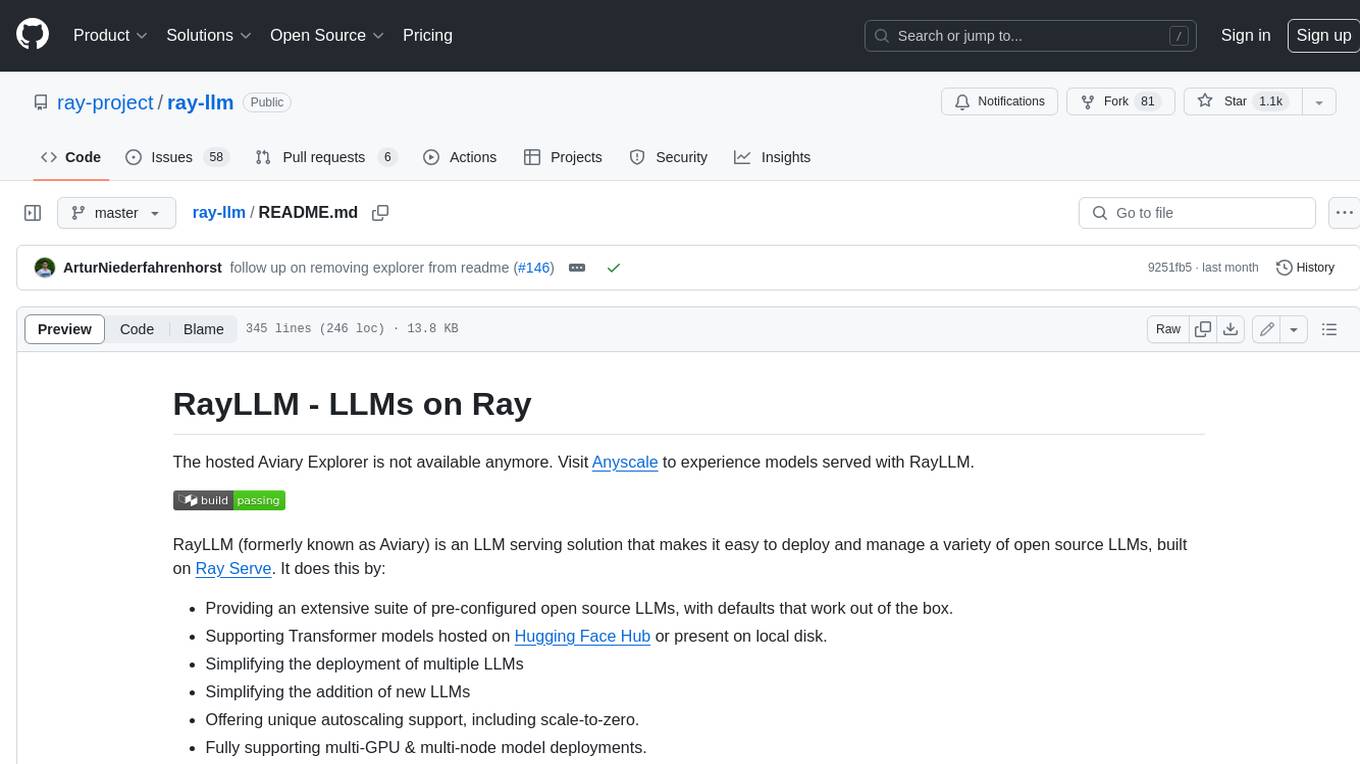
ray-llm
RayLLM (formerly known as Aviary) is an LLM serving solution that makes it easy to deploy and manage a variety of open source LLMs, built on Ray Serve. It provides an extensive suite of pre-configured open source LLMs, with defaults that work out of the box. RayLLM supports Transformer models hosted on Hugging Face Hub or present on local disk. It simplifies the deployment of multiple LLMs, the addition of new LLMs, and offers unique autoscaling support, including scale-to-zero. RayLLM fully supports multi-GPU & multi-node model deployments and offers high performance features like continuous batching, quantization and streaming. It provides a REST API that is similar to OpenAI's to make it easy to migrate and cross test them. RayLLM supports multiple LLM backends out of the box, including vLLM and TensorRT-LLM.
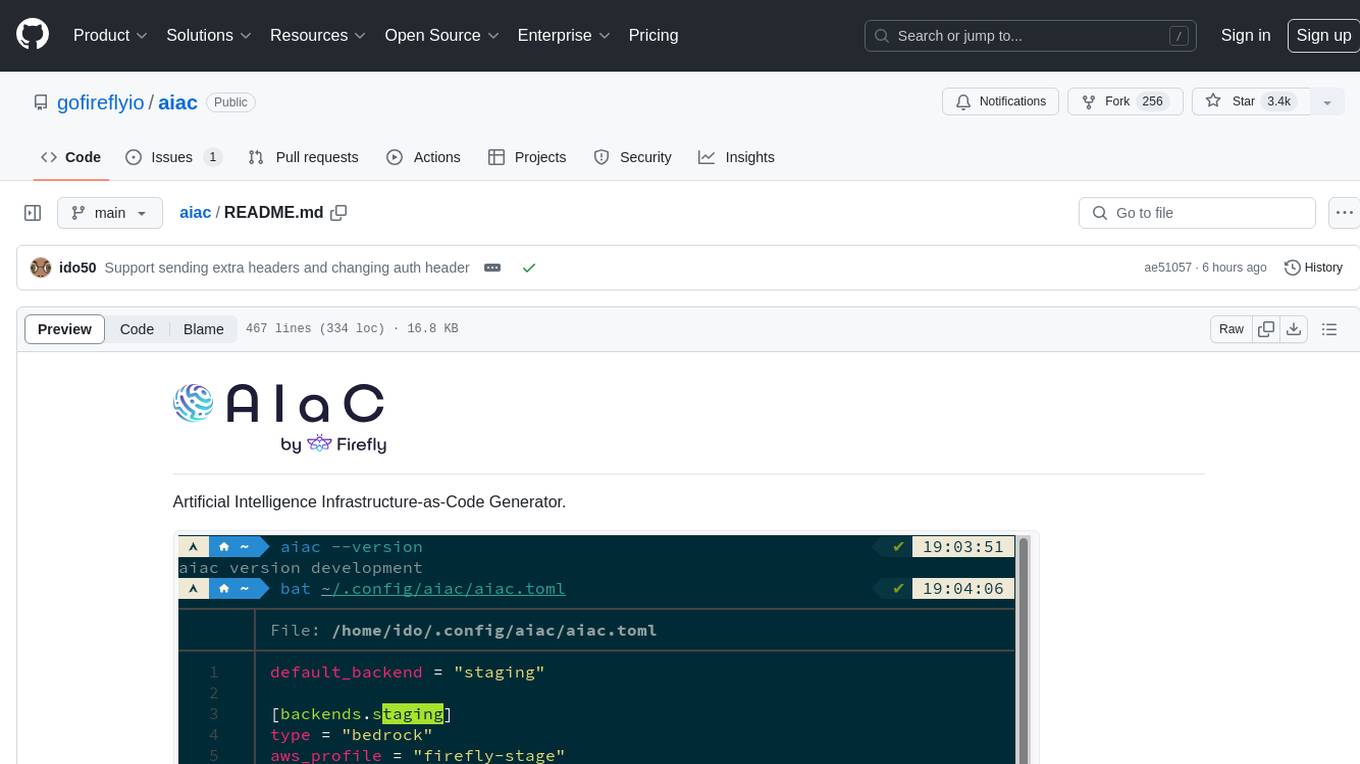
aiac
AIAC is a library and command line tool to generate Infrastructure as Code (IaC) templates, configurations, utilities, queries, and more via LLM providers such as OpenAI, Amazon Bedrock, and Ollama. Users can define multiple 'backends' targeting different LLM providers and environments using a simple configuration file. The tool allows users to ask a model to generate templates for different scenarios and composes an appropriate request to the selected provider, storing the resulting code to a file and/or printing it to standard output.
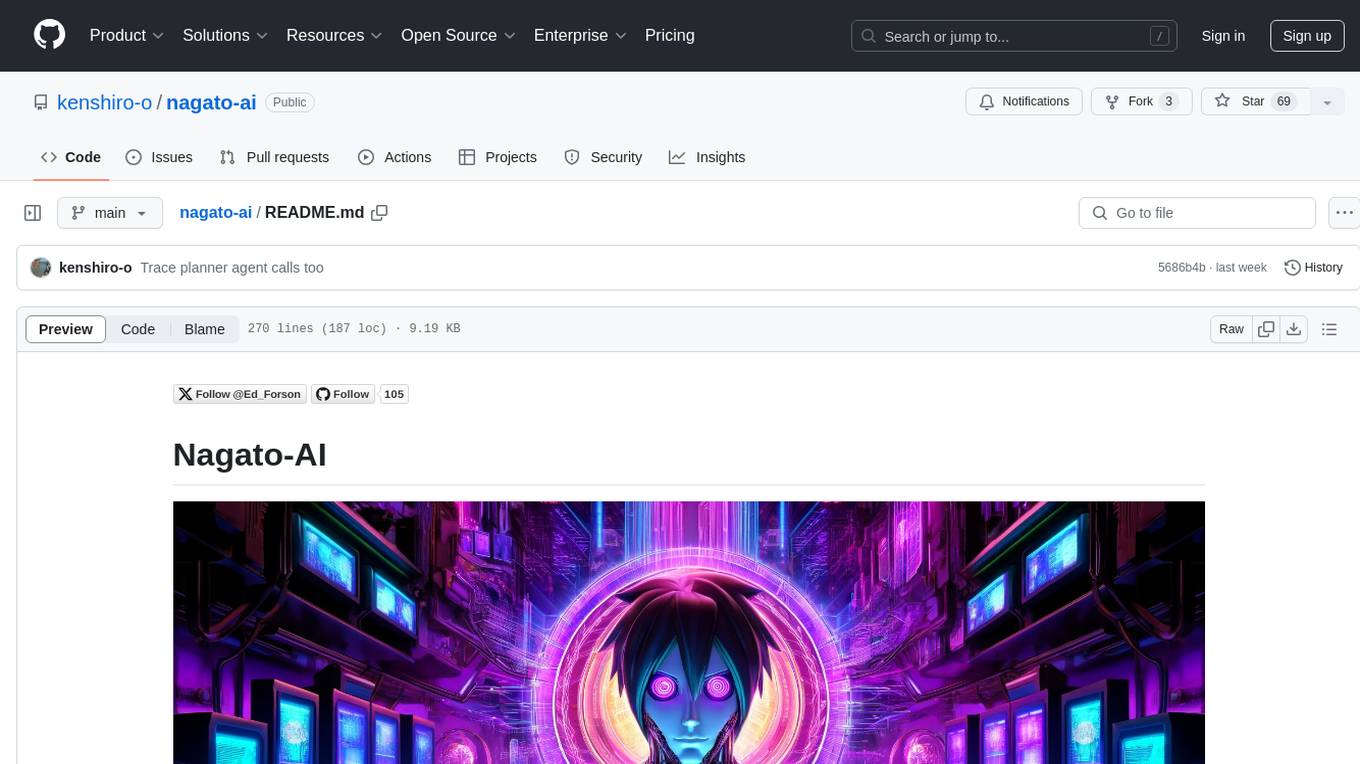
nagato-ai
Nagato-AI is an intuitive AI Agent library that supports multiple LLMs including OpenAI's GPT, Anthropic's Claude, Google's Gemini, and Groq LLMs. Users can create agents from these models and combine them to build an effective AI Agent system. The library is named after the powerful ninja Nagato from the anime Naruto, who can control multiple bodies with different abilities. Nagato-AI acts as a linchpin to summon and coordinate AI Agents for specific missions. It provides flexibility in programming and supports tools like Coordinator, Researcher, Critic agents, and HumanConfirmInputTool.
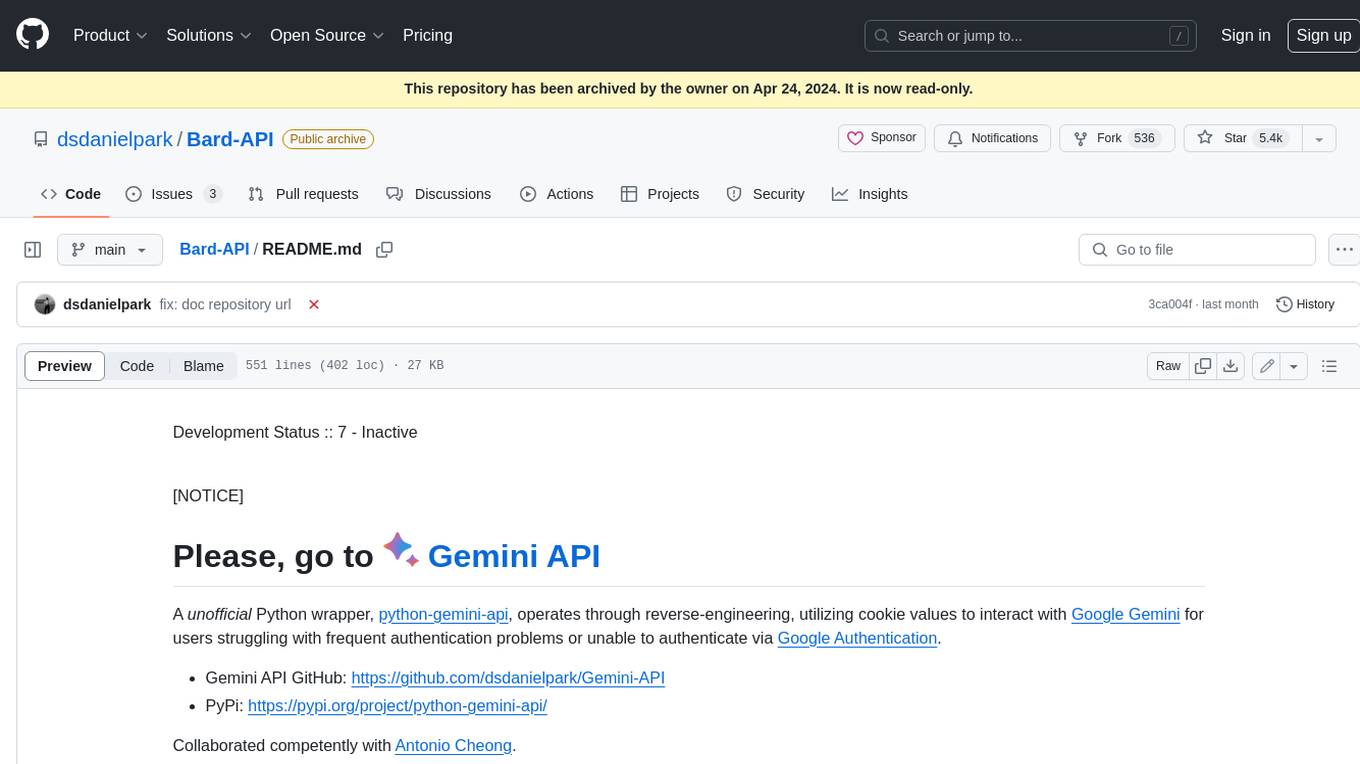
Bard-API
The Bard API is a Python package that returns responses from Google Bard through the value of a cookie. It is an unofficial API that operates through reverse-engineering, utilizing cookie values to interact with Google Bard for users struggling with frequent authentication problems or unable to authenticate via Google Authentication. The Bard API is not a free service, but rather a tool provided to assist developers with testing certain functionalities due to the delayed development and release of Google Bard's API. It has been designed with a lightweight structure that can easily adapt to the emergence of an official API. Therefore, using it for any other purposes is strongly discouraged. If you have access to a reliable official PaLM-2 API or Google Generative AI API, replace the provided response with the corresponding official code. Check out https://github.com/dsdanielpark/Bard-API/issues/262.
For similar tasks

backtrack_sampler
Backtrack Sampler is a framework for experimenting with custom sampling algorithms that can backtrack the latest generated tokens. It provides a simple and easy-to-understand codebase for creating new sampling strategies. Users can implement their own strategies by creating new files in the `/strategy` directory. The repo includes examples for usage with llama.cpp and transformers, showcasing different strategies like Creative Writing, Anti-slop, Debug, Human Guidance, Adaptive Temperature, and Replace. The goal is to encourage experimentation and customization of backtracking algorithms for language models.
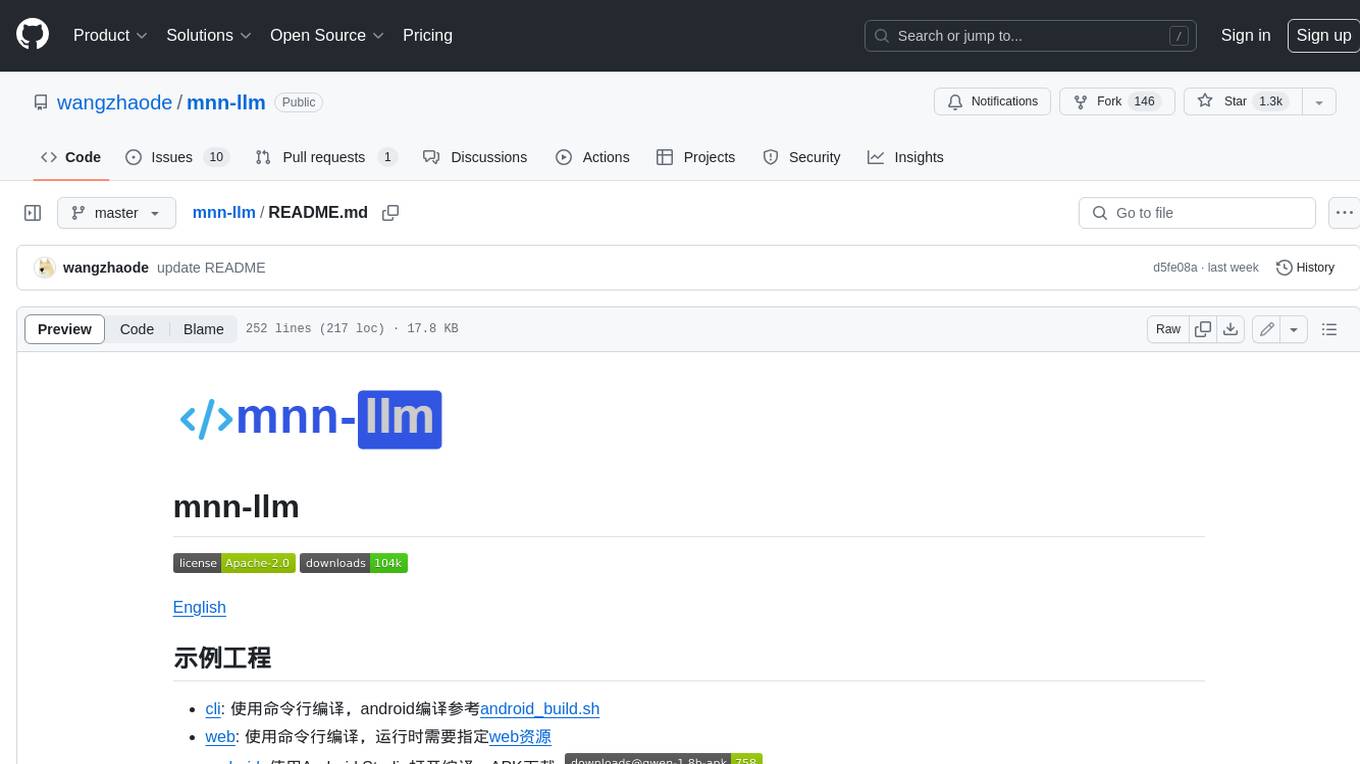
mnn-llm
MNN-LLM is a high-performance inference engine for large language models (LLMs) on mobile and embedded devices. It provides optimized implementations of popular LLM models, such as ChatGPT, BLOOM, and GPT-3, enabling developers to easily integrate these models into their applications. MNN-LLM is designed to be efficient and lightweight, making it suitable for resource-constrained devices. It supports various deployment options, including mobile apps, web applications, and embedded systems. With MNN-LLM, developers can leverage the power of LLMs to enhance their applications with natural language processing capabilities, such as text generation, question answering, and dialogue generation.
For similar jobs

sweep
Sweep is an AI junior developer that turns bugs and feature requests into code changes. It automatically handles developer experience improvements like adding type hints and improving test coverage.

teams-ai
The Teams AI Library is a software development kit (SDK) that helps developers create bots that can interact with Teams and Microsoft 365 applications. It is built on top of the Bot Framework SDK and simplifies the process of developing bots that interact with Teams' artificial intelligence capabilities. The SDK is available for JavaScript/TypeScript, .NET, and Python.

ai-guide
This guide is dedicated to Large Language Models (LLMs) that you can run on your home computer. It assumes your PC is a lower-end, non-gaming setup.

classifai
Supercharge WordPress Content Workflows and Engagement with Artificial Intelligence. Tap into leading cloud-based services like OpenAI, Microsoft Azure AI, Google Gemini and IBM Watson to augment your WordPress-powered websites. Publish content faster while improving SEO performance and increasing audience engagement. ClassifAI integrates Artificial Intelligence and Machine Learning technologies to lighten your workload and eliminate tedious tasks, giving you more time to create original content that matters.

chatbot-ui
Chatbot UI is an open-source AI chat app that allows users to create and deploy their own AI chatbots. It is easy to use and can be customized to fit any need. Chatbot UI is perfect for businesses, developers, and anyone who wants to create a chatbot.

BricksLLM
BricksLLM is a cloud native AI gateway written in Go. Currently, it provides native support for OpenAI, Anthropic, Azure OpenAI and vLLM. BricksLLM aims to provide enterprise level infrastructure that can power any LLM production use cases. Here are some use cases for BricksLLM: * Set LLM usage limits for users on different pricing tiers * Track LLM usage on a per user and per organization basis * Block or redact requests containing PIIs * Improve LLM reliability with failovers, retries and caching * Distribute API keys with rate limits and cost limits for internal development/production use cases * Distribute API keys with rate limits and cost limits for students

uAgents
uAgents is a Python library developed by Fetch.ai that allows for the creation of autonomous AI agents. These agents can perform various tasks on a schedule or take action on various events. uAgents are easy to create and manage, and they are connected to a fast-growing network of other uAgents. They are also secure, with cryptographically secured messages and wallets.

griptape
Griptape is a modular Python framework for building AI-powered applications that securely connect to your enterprise data and APIs. It offers developers the ability to maintain control and flexibility at every step. Griptape's core components include Structures (Agents, Pipelines, and Workflows), Tasks, Tools, Memory (Conversation Memory, Task Memory, and Meta Memory), Drivers (Prompt and Embedding Drivers, Vector Store Drivers, Image Generation Drivers, Image Query Drivers, SQL Drivers, Web Scraper Drivers, and Conversation Memory Drivers), Engines (Query Engines, Extraction Engines, Summary Engines, Image Generation Engines, and Image Query Engines), and additional components (Rulesets, Loaders, Artifacts, Chunkers, and Tokenizers). Griptape enables developers to create AI-powered applications with ease and efficiency.
